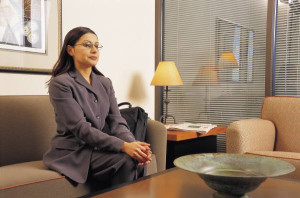Interviews cause stress. Stress is one of the first words that comes to mind when you hear the word interview. It’s natural and normal to feel stress during an interview. It is something you want and/or need, but you don’t have control over who gets hired. You can only control your knowledge, appearance and demeanor. You and everyone else facing an interview are stressed by it.
But not everyone knows how to reduce it by breathing. Not just any breathing, but diaphragmatic breathing or belly breathing. There is a remarkable relationship between how you breathe and the stress you feel. Put breathing from your diaphragm into your preparations to ace interviews.
The Benefits
When you breathe from your diaphragm, you use your entire lung. The increased lung function makes the oxygen/carbon dioxide exchange more efficient which provides more oxygen to your blood. The results of more oxygen in your blood will:
- Relax tense muscles
- Reduce stress
- Lower blood pressure
- Clearer thinking
- Lower heart rate
The Problem
When you take fast, shallow breaths from your chest, you reduce the oxygen levels in your blood. This can cause some unpleasant symptoms such as:
- Dizziness
- Muscle tension
- Depression/anxiety
- High blood pressure
- Confusion
- Rapid heart rate
If these symptoms look familiar, they are. These also happen to be the same things you feel when you interview. However, these signs can be reduced significantly by breathing from your belly or diaphragm.
Back In the Day
You used to breathe deep down in your abdomen. Everyone did. As newborns, you breathed from the belly naturally. You may even breathe like that during your sleep. Somehow, you began breathing from your chest. Perhaps it was because you were told to stand up straight with your chest out and stomach in. This position constricted your abdominal muscles then reduced the depth of your breathing. Tight clothing does the same thing as does slouching when you sit.
But you can relearn to breathe from your diaphragm. In few minutes a day, you can learn and practice breathing to increase your physical and mental wellbeing. It may feel awkward at first, but with continued practice, you can change your breathing at will. You will be able to stop stress in its tracks.
Learn How To Breathe
To begin, first find a place where you won’t be interrupted. You can either sit down with your feet on the ground or lay down on the floor.
- Place one hand on your chest and the other hand on your stomach.
- Close your eyes as you breathe slowly through your nose. Inhale the air all the way past your lungs and down into your abdomen. You should feel the hand on your stomach rise, while the hand on your chest stays where it is.
- Concentrate where you want the air to go.
- Breathe out slowly through your nose.
- Keep breathing this way for a few minutes.
- Increase the amount of time each day.
- Don’t rush and take slow even breaths.
- Practice, practice, practice
Practice while waiting for a traffic light. Practice as you are falling asleep. Practice while reading. Practice while watching a movie or TV. Practice while preparing for an interview. Practice anywhere and anytime you want. Just practice.
You need to practice so that when you have an interview, you will be ready to become relaxed and ready for anything. If you reduce your stress, you increase your interview performance. And your chances for a job offer.
How can I help you in your job search?


